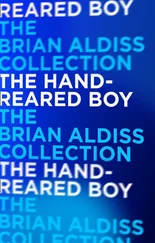Brian Aldiss - The Horatio Stubbs Trilogy
Здесь есть возможность читать онлайн «Brian Aldiss - The Horatio Stubbs Trilogy» — ознакомительный отрывок электронной книги совершенно бесплатно, а после прочтения отрывка купить полную версию. В некоторых случаях можно слушать аудио, скачать через торрент в формате fb2 и присутствует краткое содержание. Жанр: unrecognised, на английском языке. Описание произведения, (предисловие) а так же отзывы посетителей доступны на портале библиотеки ЛибКат.
- Название:The Horatio Stubbs Trilogy
- Автор:
- Жанр:
- Год:неизвестен
- ISBN:нет данных
- Рейтинг книги:4 / 5. Голосов: 1
-
Избранное:Добавить в избранное
- Отзывы:
-
Ваша оценка:
- 80
- 1
- 2
- 3
- 4
- 5
The Horatio Stubbs Trilogy: краткое содержание, описание и аннотация
Предлагаем к чтению аннотацию, описание, краткое содержание или предисловие (зависит от того, что написал сам автор книги «The Horatio Stubbs Trilogy»). Если вы не нашли необходимую информацию о книге — напишите в комментариях, мы постараемся отыскать её.
The Horatio Stubbs Trilogy — читать онлайн ознакомительный отрывок
Ниже представлен текст книги, разбитый по страницам. Система сохранения места последней прочитанной страницы, позволяет с удобством читать онлайн бесплатно книгу «The Horatio Stubbs Trilogy», без необходимости каждый раз заново искать на чём Вы остановились. Поставьте закладку, и сможете в любой момент перейти на страницу, на которой закончили чтение.
Интервал:
Закладка:
After much hesitation, hoping to run into her in the street, I went up to the number I had and rang the bell. After a while, a girl of about my age opened the door and peered out. She wore curlers in her hair, a pink apron, and fluffy pink slippers. From behind her came the cabbagey whiff of the house.
‘Yes,’ she said.
I asked politely for Sister Traven, making as if to walk in.
‘That slut ain’t in and she owes us rent!’ And with that the bitch slammed the door in my face.
Shaken, horrified, doubting, I stood back. I was conscious of people looking at me from behind curtains.
What should I do? Post Virginia a note through the door? Knock again? Wait till someone else arrived at the house? In the end I did nothing. I walked to the end of the street, stood there with my hands in my pockets, and at last went away.
Everyone must experience such bitter reversals in love. Things happen which seem nothing to do with the quality of the human beings involved, glass-sharp nasty things that come grinding up out of the system in which mankind has to live, reminders of the horrid fact that we as humans must camp out as best we can among complex series of natural laws, which came into being long before man did, and so contain no provision for him or any finer feelings.
All I could do was return to the railway station. The one distraction was meeting Spaldine, then heading back from Spalding by train. He was as subdued as I was, having come over to Nottingham to volunteer for the R.A.F. We worked our way through a cup of vile coffee and a biscuit together in the station buffet before departing to our separate platforms. Strangely enough, the name of Sister Traven emerged in our conversation, but from a guarded question I put, I gathered that he knew nothing of her whereabouts.
Back home I went, empty-handed, empty-hearted. A certain ability for self-dramatization may have eased the situation slightly. Nothing else did.
September wore on. At last my father wrote to the Head and said that he did not think any useful purpose would be served in sending me back to Branwells; I would be doing some war work until I was of age to join the forces. The Head wrote back saying he entirely understood the position, that patriotism must come first, and that he required a term’s fee in lieu of notice.
I was really alone. No, not really alone; Ann and I took to cycling off into the country with sandwiches for lunch. On one occasion Esmeralda came with us, but Ann and Esmeralda did not like each other – Esmeralda patronized her. We were completely isolated from our parents.
The old phantom idea of a war between generations is never far away in times when change makes the older generation appear obsolete instead of wise; for all that, it is a silly and distressing idea, in which both sides are losers. In 1939 that sense of division was particularly sharp.
My father volunteered for the Navy, in which he had served in the Great War (as he called it). He was turned down because he was too old. His generation was suddenly faced with the fact that they were ‘past it’. It was a generation, too, which thought of the new war in terms of the old. To men like my father, the war promised to be merely a stale repetition of the horrors of the previous conflict.
From ‘Uncle’ Jim Anderson, the war took on a different aspect I have mentioned this occasional visitor to our house. Nelson and I always suspected that there was ‘something going on’ between him and Mother. In the last days of that September everyone was changing, every relationship was changing; and ‘Uncle’ Jim, that uncertain man, was changing with the times.
He turned up one afternoon when Ann was at school, Father at the bank, and Mother on one of her walks. To my irritation, I had to make conversation to him. He marched about our living-room in the smart walking-out uniform of an infantry regiment; and my irritation was partly with myself for being impressed.
In a short while, as he talked, it dawned on me that he was not just talking to kill time until my mother returned, but was genuinely trying to communicate with me. I was too sunk into myself to respond; and I can have paid little attention to him, for, even a brief time afterwards I could not recollect what he spoke about, except that it was serious, and that he ended by saying, referring to the war, ‘I’ve wasted away my life so far – perhaps now I shall be able to make something of it!’
When he said goodbye to my mother she turned pale and ran upstairs.
Into everyone’s stagnant lives a current was circulating.
To us who were young, the air was vibrant with hopes and threats. The black on the map, by which Germany was represented, was a thrilling incarnation of evil, to which we were drawn despite ourselves. It represented a sort of liberty.
I tried to volunteer for service. I was turned down. The British Government had called up the eighteens to the forty-ones, and its hands were full organizing them. Looking back, I see it was typical of the Stubbs family that both Father and I should volunteer within a few days of each other – rather than go together and meet our rebuffs together!
Then came word from Virginia.
Sick and unsettled, I was desperately glad to hear anything. Her letter was written in her untidy scribble (‘that upper-class scrawl’, as I admiringly thought of it) on violet notepaper.
She said she had joined the Q.A.I.M.N.S. (or Q.A.R.A.N.C, as it now is) She was staying in London, in the Queensway district, with an old friend who was currently making a name for herself in a West End stage play; life was quite pleasant despite the war. She hoped I would come and see her some day before I went back to school.
Everything in that note made me at once happy and miserable. The greatest vexation was that its tone was only lightly affectionate – oh, Virginia’s tone to the life, as I realized, but what I wanted was meaty, heart-baring declarations of love!
And that bit about ‘hoping you’ll come and see me’ … She knew I had been to London only three or four times in my life, when Mother took Nelson and me down for a treat. Of course, I was gratified that Virginia asked me at all … but then there was the jibe, as I saw it, about being a schoolboy, which I no longer was.
Nor did she mention the three letters I had written to her c/o Union Street. Had she never received them? Had the young harridan grabbed them first, or had Virginia not bothered to read them? Or preferred to ignore them?
All of a sudden, my blood growing decidedly chilly, I decided that I would go down to London and see her. I would get a job near her. I could see her every day then. I would leave home. Nobody would care.
My mind was made up: I carried my resolution through. Although I have called myself timid, I have portrayed myself as acting boldly on several occasions. The two are not incompatible.
One of the mainsprings of my nature – which I was then trying ineffectually to understand – was a deep inferiority complex caused, as an anxious reading of the psycho-analytical shelf at the public library informed me, by my apparent rejection by my parents. When I once decided to do a thing I could only go through with it with the doggedness of a weak man – often to arrive at accomplishment without the wind in my sails to go further and press home the advantage I had gained. Until I grew beyond this stage I let myself in for many disappointments which cumulatively allowed me no chance to think well of my management of my own insignificant life.
Before I left home I went to say goodbye to Esmeralda. She and her mother were now alone in the big house. Esmeralda’s father had paraded through the town in dashing infantry dress uniform and then driven off to join his regiment. Esmeralda’s mother might have been alone, but she was not lonely; she made it clear that officers were welcome at her house provided they came in small parties and left in the same way. I heard Mother telling Father that she was no better than she should be; they were not keen that I should see Esmeralda, but by now I was somewhat independent and they did not like to issue direct orders in case they were disobeyed directly.
Читать дальшеИнтервал:
Закладка:
Похожие книги на «The Horatio Stubbs Trilogy»
Представляем Вашему вниманию похожие книги на «The Horatio Stubbs Trilogy» списком для выбора. Мы отобрали схожую по названию и смыслу литературу в надежде предоставить читателям больше вариантов отыскать новые, интересные, ещё непрочитанные произведения.
Обсуждение, отзывы о книге «The Horatio Stubbs Trilogy» и просто собственные мнения читателей. Оставьте ваши комментарии, напишите, что Вы думаете о произведении, его смысле или главных героях. Укажите что конкретно понравилось, а что нет, и почему Вы так считаете.












